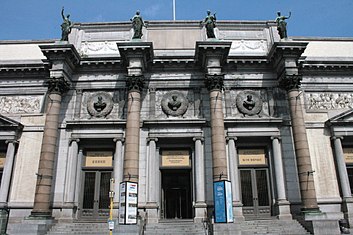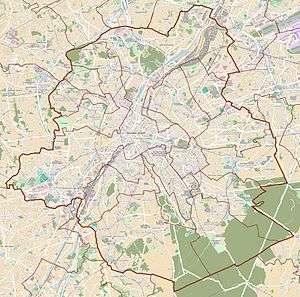Royal Museums of Fine Arts of Belgium
The Royal Museums of Fine Arts of Belgium (French: Musées royaux des Beaux-Arts de Belgique, Dutch: Koninklijke Musea voor Schone Kunsten van België) are a group of art museums in Brussels, Belgium.
 Entrance | |
 Location within Brussels | |
| Established | 1803 |
|---|---|
| Location | Brussels, Belgium |
| Coordinates | 50.841944°N 4.357778°E |
| Type | Art museum |
| Website | Official website |
The Royal Museums contains over 20,000 drawings, sculptures, and paintings, which date from the early 15th century to the present.
History
In 1845, it was decided, by Royal Decree,[1] that a museum was to be founded with works of art of deceased and living Belgian artists. A national commission was established to select important works of art. The first president of the commission was the Count de Beaufort. Other members were:
- Gustaf Wappers, president of the Royal Museum of Antwerp.
- François-Joseph Navez, president of the Académie Royale des Beaux-Arts of Brussels.
- Guillaume Geefs
- Eugène Simonis
- Tilman-François Suys, professor at the Académie Royale des Beaux-Arts.
- Luigi Calamatta, professor of engraving.
Many of the founding members were active in the Royal Academy of Science, Letters and Fine Arts of Belgium.
The museums
The museums are situated in the downtown Royal District, on the Coudenberg, in Brussels. There are six museums connected with the Royal Museums; two of them are located in the main building – the Oldmasters Museum or Museum of Ancient Art, whose collections cover European art until 1750, and the Museum of Modern Art. The Magritte Museum, opened in 2009, and Fin-de-Siècle Museum, opened in 2013, are adjacent to the main building.[2][3] The smaller Constantin Meunier Museum and the Antoine Wiertz Museum, dedicated to these two Belgian artists, are located a few kilometers from the city centre.
Oldmasters Museum

The museum has an extensive collection of paintings, sculptures and drawings from the fifteenth to the eighteenth century. The bulk of the collection is formed around Flemish painting, presented in chronological order. For example, there are valuable panels by the Flemish Primitives (including Bruegel, Rogier van der Weyden, Robert Campin (the Master of Flémalle), Hieronymus Bosch, Anthony van Dyck, and Jacob Jordaens). The museum is also proud of its "Rubens Room", which houses more than 20 paintings by the artist. The painting Landscape with the Fall of Icarus, long-attributed to Bruegel, is located there and forms the subject of W. H. Auden's famous poem "Musée des Beaux Arts", named after the museum. There are also constant temporary exhibitions.
Magritte Museum
The museum has one of the richest collections of paintings by the Belgian surrealist painter René Magritte. Inaugurated on 20 May 2009, the Magritte Museum opened on 2 June 2009.
Fin-de-Siècle Museum
Inaugurated on 6 December 2013, the museum presents collections of artists such as Constantin Meunier, James Ensor, Henri Evenepoel, Fernand Khnopff, Leon Spilliaert, Jusepe de Ribera, Jacques-Louis David and George Minne.
Wiertz Museum
The life and work of Antoine Wiertz are honored in the painter's former studio, in the heart of the Leopold Quarter. This unique museum offers a striking view of the monumental paintings, statues and sketches marked by the Belgian romantic movement.
Meunier Museum
Located in the former house and workshop of Constantin Meunier, the museum houses 150 works and documents by the realist painter and sculptor.
Directors
The chief curators or directors of the museum have been:
- 1961–1984: Philippe Roberts-Jones
- 1985–1989: Henri Pauwels
- 2005–present: Michel Draguet
The building
The main building which now houses the Museum of Ancient Art was built as the Palais des Beaux-Arts, designed by Belgian architect Alphonse Balat and funded by King Leopold II. Balat was the king's principal architect, and the building was one part of the king's vast construction projects for Belgium. The building was completed in 1887, and stands as an example of the Beaux-Arts architecture use of themed statuary to assert the identity and meaning of the building.[4]
The extensive program of architectural sculpture includes the four figures of Music, Architecture, Sculpture, and Painting atop the four main piers, the work of sculptors Égide Mélot, Joseph Geefs, Louis Samain, and Guillaume de Groot respectively. The finial, gilded Genius of Art was also designed by de Groot. The three rondels of Rubens, van Ruysbroek, and Jean de Bologne, who represent Painting, Architecture, and Sculpture, are the work of Antoine-Joseph van Rasbourgh, Antoine-Félix Bouré and Jean Cuypers. The two bas-relief panels are Music by Thomas Vincotte and Industrial Arts by Charles Brunin. The two bronze groups on pedestals represent The Crowning of Art by Paul de Vigne, and The Teaching of Art by Charles van der Stappen.[5]
On the side of the building, a memorial commemorates five members of the Mouvement National Royaliste, a resistance group, killed during the liberation of Brussels on 3–4 September 1944.[6] Alongside the western face of the building is a sculpture park, with works by Aristide Maillol, Emilio Greco, Paul Hanrez and Bernhard Heiliger.
See also
- Belgian Federal Science Policy Office
- Centre for Fine Arts
- Culture of Belgium
- Royal Museums for Art and History
Further reading
- Grant Allen (1904), "Brussels Picture Gallery", Belgium: its cities, Boston: Page
References
- Het Handelsblad, 3 December 1845
- "Museums - Royal Museums of Fine Arts of Belgium". Retrieved 26 May 2016.
- Trend, Nick (6 December 2013). "Brussels: Inside the new Musée Fin-de-Siècle". The Telegraph. Retrieved 26 May 2016.
- Fine-arts-museum.be accessed 9/1/10
- Chronique d'un musée: Musées royaux des beaux-arts de Belgique, Bruxelles By Franc̜oise Roberts-Jones, page 41
- "Monument: National Royalists Monument". Brussels Remembers. Archived from the original on 2013-04-19.
External links
| Wikimedia Commons has media related to Royal Museums of Fine Arts of Belgium. |